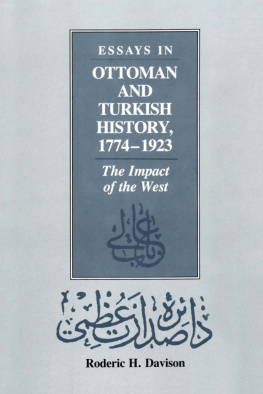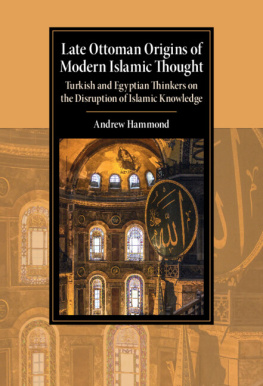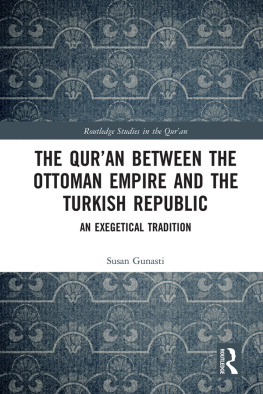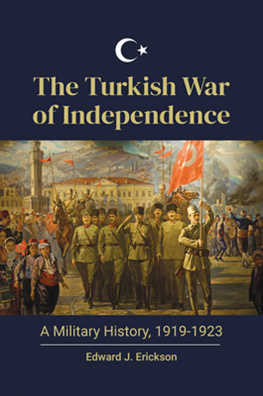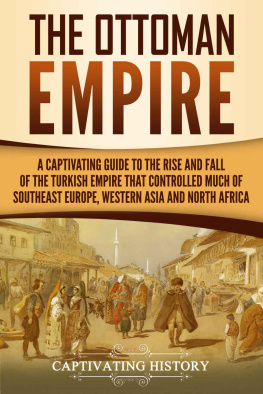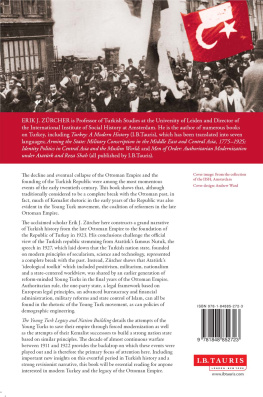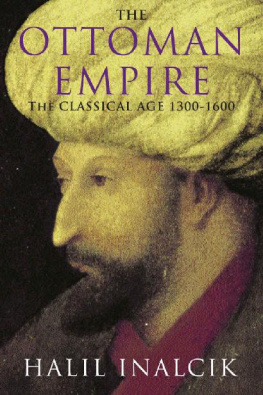Davison - Essays in Ottoman and Turkish history, 1774-1923: the impact of the West
Here you can read online Davison - Essays in Ottoman and Turkish history, 1774-1923: the impact of the West full text of the book (entire story) in english for free. Download pdf and epub, get meaning, cover and reviews about this ebook. City: Turkey, year: 1990, publisher: University of Texas Press, genre: Religion. Description of the work, (preface) as well as reviews are available. Best literature library LitArk.com created for fans of good reading and offers a wide selection of genres:
Romance novel
Science fiction
Adventure
Detective
Science
History
Home and family
Prose
Art
Politics
Computer
Non-fiction
Religion
Business
Children
Humor
Choose a favorite category and find really read worthwhile books. Enjoy immersion in the world of imagination, feel the emotions of the characters or learn something new for yourself, make an fascinating discovery.
Essays in Ottoman and Turkish history, 1774-1923: the impact of the West: summary, description and annotation
We offer to read an annotation, description, summary or preface (depends on what the author of the book "Essays in Ottoman and Turkish history, 1774-1923: the impact of the West" wrote himself). If you haven't found the necessary information about the book — write in the comments, we will try to find it.
The effect of Western influence on the later Ottoman Empire and on the development of the modern Turkish nation-state links these twelve essays by a prominent American scholar.
Davison: author's other books
Who wrote Essays in Ottoman and Turkish history, 1774-1923: the impact of the West? Find out the surname, the name of the author of the book and a list of all author's works by series.
Essays in Ottoman and Turkish history, 1774-1923: the impact of the West — read online for free the complete book (whole text) full work
Below is the text of the book, divided by pages. System saving the place of the last page read, allows you to conveniently read the book "Essays in Ottoman and Turkish history, 1774-1923: the impact of the West" online for free, without having to search again every time where you left off. Put a bookmark, and you can go to the page where you finished reading at any time.
Font size:
Interval:
Bookmark:
Modern Middle East Series, No. 16
Sponsored by the Center for Middle Eastern Studies
The University of Texas at Austin
Essays in Ottoman and Turkish History, 17741923
The Impact of the West
Roderic H. Davison

UNIVERSITY OF TEXAS PRESS
AUSTIN
Copyright 1990 by the University of Texas Press
All rights reserved
First Edition, 1990
Requests for permission to reproduce material from this work should be sent to Permissions, University of Texas Press, Box 7819, Austin, Texas 78713-7819.
Library of Congress Cataloging-in-Publication Data
Davison, Roderic H.
Essays in Ottoman and Turkish history, 17741923 : the impact of the West / Roderic H. Davison. 1st ed.
p. cm. (Modern Middle East series ; no. 16)
Includes bibliographical references.
ISBN 0-292-72064-5
1. TurkeyHistoryAbdul Hamid I, 17741789. 2. TurkeyHistorySelim III, 17891808. 3. TurkeyHistory19th century. 4. TurkeyHistory20th century. 5. TurkeyCivilizationOccidental influences. I. Title. II. Series : Modern Middle East series (Austin, Tex.); no. 16.
DR555.D38 1990
956.1'015dc20
89-70774
CIP
ISBN 978-0-292-75893-3 (library e-book)
ISBN 978-0-292-75894-0 (individual e-book)
DOI: 10.7560/720640
To my students, who for the past fifty years have made the teaching ofhistorya stimulating adventure, andto the librarians, archivists, editors, designers, printers, andmembers of academic, scholarly, and eleemosynaryinstitutionscolleagueswhose help has made the search and the writing sopleasurable.
Acknowledgments
The staffs of a number of libraries have been helpful in many ways. These include the Library of Congress (especially its Near East, Law, and Stack and Reader divisions), the Harvard College Library, the Princeton University Library, the George Washington University Library, the New York Public Library, the University of Chicago Library (especially its Middle East Documentation Center), the Middle East Institute Library, the British Library (formerly British Museum) with its Colindale branch, the Bibliothque Nationale, and the Engineering Societies Library.
I am grateful also to the staffs of the Babakanlk Arivi (Prime Ministry Archive) and the D-Ileri Bakanli Hazine-i Evrak (Foreign Ministry Archive) in Istanbul, and to the Prime Ministers Office and the Foreign Ministry of Turkey, for permission to do research in those repositories. I have received many courtesies, further, from the Public Record Office (London), the Haus-Hof- und Staatsarchiv (Vienna), and the United States National Archives (Washington). Thanks are due also to the American Board of Commissioners for Foreign Missions (now the United Church Board for World Ministries) for permission to use their archives, presently housed in the Houghton Library at Harvard, and formerly in the Divinity School library there.
For fellowships and research grants, I am indebted to the John Simon Guggenheim Memorial Foundation, the Social Science Research Council, the American Research Institute in Turkey, the Middle East Center of Harvard University, and George Washington University. For support of publication, I am grateful to the Institute of Turkish Studies and the Center for Middle Eastern Studies of the University of Texas at Austin.
Thanks are due also to the copyright holders of the essays in this volume that have earlier been published elsewhere; the credit for each appears at the bottom of the first page of the essay.
Introduction
The Ottoman Empire at the start of the nineteenth century still covered a vast territory, including all of North Africa except Morocco, the whole Balkan peninsula, Anatolia, Syria, Iraq, and parts of the Arabian peninsula. Its hold on much of the area was, however, tenuous. Its peoples were many; Turks numbered somewhat fewer than half. In a world increasingly dominated by European power and increasingly agitated by nationalist sentiments this multiethnic Ottoman state struggled to survive. In its last century and a half it experienced both successes and failures in the quest for greater viability. After suffering defeat in the First World War, however, it finally disappeared. Among its successor states was the Turkish Republic, which established itself in the Anatolian core of the old empire.
All the essays in this volume excepting the first, a broad survey of Turkish history, examine events or developments in this period of Ottoman decline and reform, and of the birth of the republic. The modern history of Europe is often taken to begin with the French Revolution of 1789. The beginning of the modern history of the Ottoman Empire is sometimes linked to a dramatic event produced by that revolution, Napoleons invasion of Egypt in 1798. But the beginning can also conveniently be put at 1774, the year of the peace treaty sealing a major defeat of the Ottoman Empire by Russia, an event that pushed the Ottoman sultans toward more serious efforts at westernizing reforms. The essays begin with this treaty of Kk Kaynarca. They end essentially with the treaty of Lausanne of 1923, which launched the republic on its life as an independent sovereign state. Most of them focus on political and diplomatic developments, but they also concern religious, intellectual, social, and economic aspects of the Ottoman world. Eleven of these studies, written for varying purposes, appeared originally in widely scattered publications over a span of thirty-three years, beginning in 1948. They are here collected for the first time and again made available. One new study, on the advent of the electric telegraph in the Ottoman Empire, has been included. Because each essay is designed to stand alone, there is occasional overlapping when one complements another.
Although independent, the essays are linked by a common theme. The linkage, which was not intentional when they were written, flows logically from the course that Ottoman history took in these years. Every essay deals with change, and in every case with change that came about because of the impact of the West. The essay Foreign and Environmental Contributions to the Political Modernization of Turkey focuses most specifically on that impact, but all reflect change that occurred directly or indirectly because of contact with the West.
For the Ottomans, the West in the modern period was essentially Europe. America was distant and uninvolved; individual Americans had some impact on Ottoman society, but it was modest. Europe meant, in general, a somewhat French-flavored western civilization shared by peoples in a number of large and small states, in many of which technology and industry were advancing rapidly. More specifically, Europe meant the great powers, the governments who dominated international affairs and referred to themselves as the Concert of Europe. From the eighteenth century until 1861 they were the Pentarchy of EuropeBritain, France, Austria, Prussia, and Russia. Then Italy was added as a sixth power when it became a unified kingdom, and in 1871 the unified imperial Germany replaced Prussia. Russia was a member of this western group, a full participant in European great power politics and also since the time of Peter the Great a country consciously westernizing first the military and then some other aspects of Russian life. Only after the Bolshevik revolution of 1917 was Russia split from her great power fellows to become East. In the essay Turkish Diplomacy from Mudros to Lausanne there appear Easterners among the Turks, those who in the postwar nationalist struggle looked to Russia for cooperation and aid, as opposed to the Westerners, who preferred ties to the western European powers.
Next pageFont size:
Interval:
Bookmark:
Similar books «Essays in Ottoman and Turkish history, 1774-1923: the impact of the West»
Look at similar books to Essays in Ottoman and Turkish history, 1774-1923: the impact of the West. We have selected literature similar in name and meaning in the hope of providing readers with more options to find new, interesting, not yet read works.
Discussion, reviews of the book Essays in Ottoman and Turkish history, 1774-1923: the impact of the West and just readers' own opinions. Leave your comments, write what you think about the work, its meaning or the main characters. Specify what exactly you liked and what you didn't like, and why you think so.

